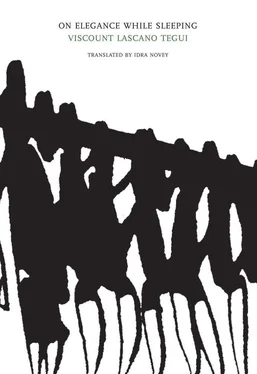In other parts of the novel, the seductiveness of transvestitism and homosexuality is treated with contempt, in keeping with the reigning societal ethic, which today is quite difficult to comprehend. As such, the narrator establishes a parodic distance from homosexuality, resorting to the crudest naturalist tendencies. The stigma of the homosexual’s condition is thus visible in his hands: “Have you ever seen anything quite so blunt yet unreliable as the thumbs of a sodomite? Next to the rest of their dapper, delicate hands, their thumbs stand out like bastards…”
For that reason the narrator proposes, “They should really only have four fingers on each hand.”
The fragmentary nature of the text is intensified by the use of certain typographical features, chiefly the copious blank spaces and, in the original edition, the illustrations of Raúl Monsegur. Fragmentation, but also ambiguity; the ambiguity typical of a genre that pretends to be private, yet is made public. The illusion of authenticity that the canon bestows upon the personal diary (especially since the end of the nineteenth century) cannot conceal the paradoxical status engendered by the tension between the private and the public. Due to this tension, every personal diary that is published ends up negating itself as such; what is highlighted in this negation is the ambiguity of all literature and a disbelief in all literature that pretends to be realist or verisimilar.
Lascano Tegui also distances himself from the genre of the personal diary when he defines it at the end of the entry dated “September 4, 18—,” one of the few occasions in which the text appears to deal with personal feelings:
This page is inexplicable in the diary of my life. I’ve written it tenderly, as though I was once in love. It seems like sacrilege to include it as part of this intimate experiment, in which we’re testing the consolatory effects of speaking badly about others to ourselves.
On the other hand, the novel’s openness to the most seemingly trivial things — like the grooming of one’s fingernails — illustrates two virtues that modern society tends to consider vices: the cult of idleness and the cult of the minimal. The very idea of a personal diary suggests that the text is composed of “idle” musings, or at least that it’s the kind of book that is only possible when one has plenty of free time, plenty of time that isn’t spent doing actual paid work; and when this impression is further confirmed by the fact that the book begins with an almost hyperrealist episode about a minimal detail like fingernails and fingernail clippings, the substitution of the ridiculous for the serious and the important seems assured.
At any rate, an unreliable autobiography that takes the form of a personal diary raises many questions. One has to do with what can be called the biographical and autobiographical impulse in Lascano Tegui. Indeed, one could read his El libro celeste (1936) as a biography of an entire country, with a focus on the Viscount’s own particular autobiography, or read El Muchacho de San Telmo ( The Kid from San Telmo , 1944) as an oscillation between this autobiography and the biography of a city, or at least one of its neighborhoods.
The violence of Lascano Tegui’s gesture — the parodic appropriation of the genre of personal diary — might cause some initial perplexity and discouragement in a reader, perhaps exacerbated by the novel’s focus on the trivial as the starting point for its “story.” Furthermore, the novel is doubly removed from anything resembling a real diary, since the immediacy of what we expect from diaries — the sensation of living in the moment — is replaced by the defining trait of the genre of autobiography: recounting a life that has already been lived. “This journal I write, almost without wanting to, as dusk falls, doesn’t always paint a true picture of what’s happened to me. Rather, these are evocations of events, the memory of which passes its pen across my brow.”
Within this space, this vacillation between genres, Tegui presents a personal history that is structured in such a way as to culminate with a crime (in this, the influence of de Quincey’s “On Murder Considered as One of the Fine Arts” weighs heavily). The entire text moves in this direction. If all writing is displacement, transference, travel, movement, Lascano Tegui — great traveler that he is — constructs an itinerary that departs from what we’ll call “the customs of the drowned” (taking a cue from Alfred Jarry) and travels toward the consummation of a gratuitous murder. The voyage begins earlier, however, with the manicure that readies those criminal hands and kicks off the trip:
My hands no longer looked like they belonged to me. I put them on my table, in front of my mirror, and changed their positions in the light. With the same sense of self-consciousness one feels when posing for a photographer, I picked up a pen and began to write.
That’s how I started this book.
At the Moulin Rouge that night I heard a woman standing nearby say in Spanish: “He cares for his hands like a man preparing for a murder.”
The depiction of the hand as fetish object runs through the entire book, from the hand that does the writing to the idea of writing as the consummation of a crime. Along the route that leads from the pencil to the dagger, the “theme of the hand” takes us down numerous detours — there is the fear of amputation in severed hands and severed genitals; hands that caress genitals, sometimes kindling fear and other times pleasure; the hands of the dead; hands with curative powers wearing black fingerless gloves or the clumsy hands that perform abortions; the hands of the drowned, upraised as if signaling for help; the hand of the onanist and the hand of the “sodomite.” Tegui’s image of death: “I’ve watched my family fall the way a leper watches his cold, swollen hands drop off in pieces.”
The Viscount surprises us with the ephemeral, fragmentary quality conferred upon his text by the outrageousness of writing about serious subjects in a light, sardonic tone. The elegant tightrope act of narrating gratuitous crime, rape, abortion, homosexuality, the world of the brothel (an orientalized one, at that), the human body corrupted by illnesses: typhoid fever, tuberculosis, syphilis, insanity, leprosy; filth, misery, the secret and the shameful: everything that is not to be spoken of. This novel surprises us by the levity of its tone, as well as by something that I would provisionally define as the intersection between a certain naturalist aesthetic and a pataphysical air.
And then it is also true that our Viscount crossed paths with the more working-class Roberto Arlt, who at this same time was publishing two prose pieces in Proa —the literary magazine run by Jorge Luis Borges, Brandan Caraffa, Ricardo Güiraldes, and Pablo Rojas Paz — which would eventually become two chapters of the famous Mad Toy (1926).
There are mysterious points of contact between Arlt and Lascano Tegui, as well as differences that may prove relevant: whereas Arlt works with some seriousness, the Viscount adopts the guise of frivolity. They can be read as two contemporary yet divergent aesthetics, products of the same period pointing to two different literary spaces. On the one hand, sex and money: a poetics of labor. On the other hand, sex and idleness: a poetics of laissez faire . A willful misreading. One wonders if the secret to Lascano Tegui’s writings might also lie in a willful misreading.
CELINA MANZONI
UNIVERSITY OF BUENOS AIRES
Translated by Rhett McNeil
I write out of pure voluptuousness, I confess. I write for myself and for friends. I don’t have a large audience or fame and don’t receive awards. I know all the literary strategies intimately and despise them. The naïveté of my contemporaries pains me, but I respect it. I’m also conceited enough to believe I never repeat myself or steal from other writers, to believe I’ll always remain a virgin, and this narcissism doesn’t come cheap. I have to suffer the indifference of those around me. But, as I said, I write out of pure voluptuousness. And so, like a courtesan, I’ll take my sweet time, and begin by kicking off my shoe.
Читать дальше












